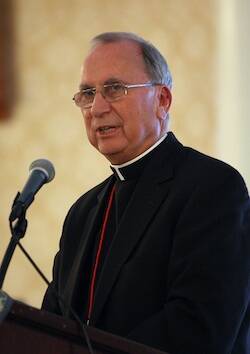The federal budget crunch should not be eased by cutting programs that help the poor, refugees and the unemployed in the United States or those struggling in developing nations, warned church leaders. “In a time of economic crisis, the poor and vulnerable are in greater need of assistance, not less,” said Bishop Stephen E. Blaire of Stockton, Calif., chairman of the U.S. bishops’ Committee on Domestic Justice and Human Development, in a letter to Congress on Feb. 14. A second letter from Ken Hackett, president of Catholic Relief Services, and Bishop Howard J. Hubbard of Albany, N.Y., chairman of the Committee on International Justice and Peace, noted cuts of up to 26 percent of funding in programs for international assistance this year, but only 2.6 percent in cuts for the overall budget. “Shared sacrifice is one thing,” said Hackett and Bishop Hubbard; “it is another to make disproportionate cuts in programs that serve the most vulnerable.” The Rev. Larry Snyder, president of Catholic Charities USA, urged policymakers to improve government efficiency before resorting to cuts.
Budget Priorities
Show Comments (
)
Comments are automatically closed two weeks after an article's initial publication. See our comments policy for more.
The latest from america
Who are the frontrunners entering the conclave, and how the voting could quickly confirm papabile lists or pivot to an unexpected candidate
Cardinal Frank Leo, the 53-year-old archbishop of Toronto, told Gerard O’Connell that he does not think age or nationality is an important factor in choosing the next pope. His top priority? A leader who listens.
The choice of method, more than any difference in underlying doctrine, is where Pope Francis departed most radically from his predecessors.
The conclave opens tomorrow, and the energy around the Holy See Press Office is alarmingly calm.








